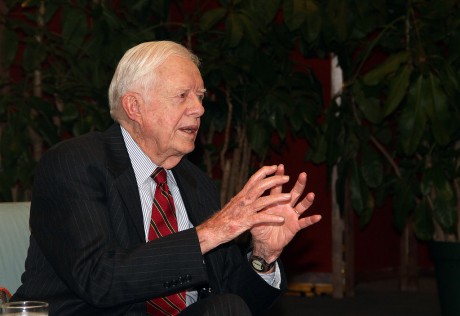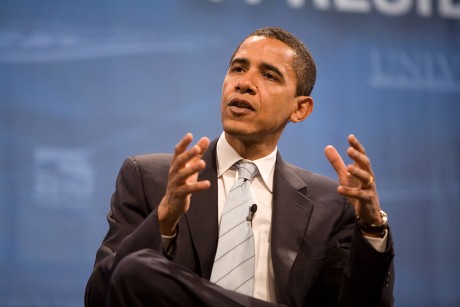[T]here are ethical principles in the Bible which apply to every form of injustice. As we have seen, the principle of love to God and neighbor, as well as enemy, is the fundamental basis of Christian conduct. Involved in this kind of love is the principle of justice. Indeed, justice is love in action. Biblical love is not sentimentality, but seeks justice for all. Love does no harm to, but seeks the good of, neighbor in every realm of his existence.
The passage above appeared in 1961 — quite coincidentally, the year of my birth — in a book titled Introducing Christian Ethics. Its author was Henlee H. Barnette, a highly respected author and professor at the Southern Baptist Theological Seminary.
I first encountered this particular work of Barnette’s when I enrolled at Samford University and had it assigned as a primary text for a compulsory freshman religion class. In the interim between the initial publication of the book and my arrival at college from my small northwest Alabama town, I had grown up and come of age in the Baptist church of the 1960s and ‘70s, in a time and place where I saw the moral and ethical imperatives Barnette spelled out — love and justice as the foundation of Christianity — applied in the individual lives of the adults I looked up to and learned from, at church and in school.
Still, by that late summer of 1980, I was aware that changes were afoot in denomination in which I grew up. The emergence of the so-called “Religious Right” was in full swing, a gathering wave of political activism that would help propel Ronald Reagan to the presidency less than three months into my freshman year — a turn of events that greatly accelerated my budding skepticism of organized religion in general, and my sense of connection to the Southern Baptists in particular.
Here, I have to admit that I didn’t delve too deeply into Dr. Barnette’s book that first semester. Instead, I skipped a lot of class to volunteer in the Birmingham office of President Jimmy Carter’s reelection campaign. Come to think of it, all of this — entering college; having my beliefs and ideals put to the test in new ways; developing my own sense of spirituality; working on the campaign of a fellow Southerner whose progressive outlook and outspoken religious faith had inspired and helped shape my own political development — probably has a lot to do with why I sometimes refer to myself today as a “Jimmy Carter Baptist.”
What does that mean? It means that I am one who long ago ceased to affiliate with the Southern Baptist denomination, but who remains proud of my spiritual heritage and still credits the church of my childhood with a large role in making me the person I am — at least to the extent that I am one of any worth.
Put another way, it means that in a very real and personal sense, I’m still a Baptist in my soul — except for the fact that I don’t hate anybody. Not blacks, not Muslims, not atheists. Not the poor, and not immigrants. Not scientists or scholars, not gays and lesbians. Not the GOP, nor the NRA, nor even the KKK. Paraphrasing Barnette, who was paraphrasing Jesus, anyone who would have himself counted a good person must love not only his neighbors, but also his enemies. He must strive to find common ground with those with whom he disagrees.
These admonitions seem lost on today’s Southern Baptists. Over a generation and more, the denomination has devolved to a position that was described succinctly by a onetime student of Barnette’s in a 2006 speech that evoked the ethical legacies of two Baptists who won the Nobel Peace Prize — Jimmy Carter and Martin Luther King — while pondering the prospect of a bleak spiritual future.
“What will happen to the great tradition of 20th century Baptist social ethics in the 21st century?” asked Larry McSwain, a professor at the McAfee School of Theology at Atlanta’s Mercer University. McSwain hailed what he termed the “prophetic consciousness” with which progressive-minded leaders and teachers like Barnette and others became imbued in Southern Baptist seminaries, but bemoaned the loss of that consciousness in the current generation.
“That consciousness can no longer be found in the six seminaries of a denomination more committed to affirming a culture of consumerism, so-called just war and right-wing politics,” McSwain declared.
That this outlook has not improved in the nine years since McSwain offered his assessment is borne out amply in the official reaction of the Alabama Baptist State Board of Missions (ABSBOM) to the legal recognition of the right to same-sex marriage in our state. On Feb. 6, in the aftermath — jubilant in some circles, greeted in others as if it were tidings of the world’s imminent end — of the Jan. 23 decision by federal Judge Ginny Granade, and in advance of the Feb. 9 expiration of a stay on allowing same-sex marriages to move forward, the board’s 100-plus members approved unanimously a resolution “reaffirming” “biblical” marriage.
We grieve over the abandonment of biblical marriage as the cornerstone of our society, a statement released after the vote read. We pray that the U.S. Supreme Court will soon rule in a way that will protect states such as Alabama where voters have by majority vote expressed support for biblical marriage only.
We cannot speak out on every issue,” ABSBOM executive director Rick Lance told The Alabama Baptist, “but biblical marriage is foundational to our culture. Change marriage laws and you change culture. Erode family and marriage and you erode the society in which we live.”
Lance did not elaborate on just how allowing two people who love each other to join in legally sanctioned communion would “erode family and marriage” — but then, I’m really not interested. Of greater importance to me is his acknowledgement that he and his brethren on the board “cannot speak out on every issue,” because in that I am very interested.
Why, for instance, do we not hear from ABSBOM on the subject of poverty? We live in a state where more than 900,000 people — more than a quarter-million of them children — will go to bed tonight and wake up tomorrow, and the next day and the next, in poverty. Where hundreds of thousands more live each day on the razor-thin margin between “official” poverty and just plain old doing without. Where the means of raising people out of poverty — education, transportation, healthcare, child care, good-paying jobs — not only go unaddressed, but are in fact under attack by a governor and legislature for which Alabama Baptists support in near unanimity.
We do not hear from ABSBOM on these topics, let alone see any substantive action from people who purport to uphold a religious heritage that is founded on the straightforward ideals of love and justice. Why?
What we do hear from ABSBOM, in the statement proclaiming its grief over same-sex marriage, is that the board and its members will “pray for those with whom we disagree, specifically those who advocate the abolition of biblical marriage as the only legally sanctioned form.”
To which my response is, Well, folks, I don’t know if you’re any more interested in what I plan to do than I am in your definition of “biblical” marriage, but here it is, from a former Baptist to the people who drove me away from the denomination of my upbringing: Jesus told us to love our enemies — and in my view, that includes the enemies of love and justice and reason and fellowship — so I’m going to pray for you, too. I’m going to pray, and hope fervently that one day, you’ll see the light.






